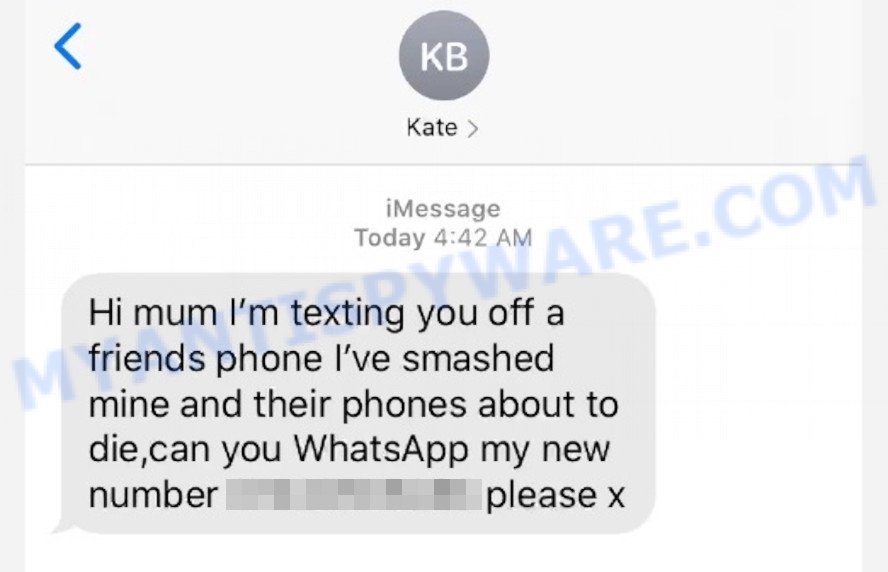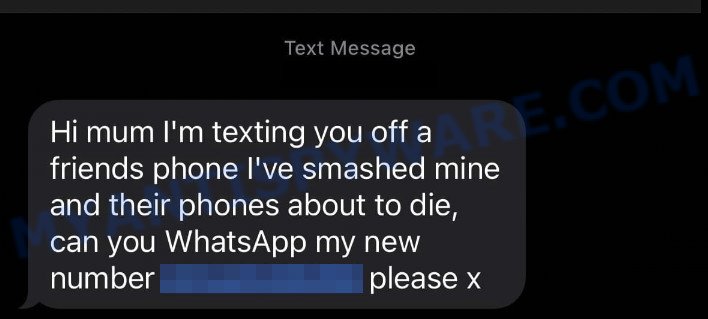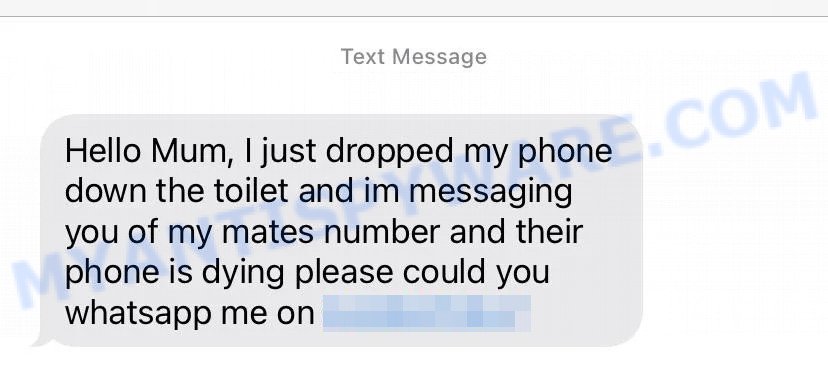The “Hi Mum” scam, also known as the “Family Emergency” scam, is a deceptive tactic used by fraudsters to manipulate individuals into sending money or personal information. This scam has become increasingly prevalent in recent years, with scammers targeting vulnerable individuals who are willing to help a family member or friend in distress. In this article, we will explore the details of the “Hi Mum” scam, how it works, and provide tips on how to avoid falling victim to this type of fraud.

QUICK LINKS
- What Is the Hi Mum Scam?
- How the scam works?
- Examples of the ‘Hi Mum’ Scam: Real-Life Messages Used by Scammers
- What to do when you get the “Hi Mum” scam text?
- Staying Safe from the ‘Hi Mum’ Scam: What Scammers Can Do with Your Phone Number and Why You Shouldn’t Text Them Back
What Is the Hi Mum Scam?
The “Hi Mum” scam is a type of fraud where scammers impersonate a family member or close friend in urgent need of financial assistance. The scammer usually begins the scam by sending a message to the victim claiming to be a family member or friend who is in trouble, often using emotional language to add urgency to the message.
The scammer may claim that they have been in an accident, their phone has been lost or stolen, or they are in some other type of emergency situation. They will then ask the victim to send money immediately to help them out of their predicament.
A typical “Hi Mum” scam text reads as follows:
Hi mum I’m texting you off a
friends phone I’ve smashed mine
and their phones about to die,
can you WhatsApp my new
number XXXXXXXX please x
To make the scam seem more legitimate, the scammer may even provide some personal information about the family member or friend they are impersonating, such as their name, phone number, or other details that the victim may be familiar with.
The scammer may also ask the victim to keep the situation a secret, claiming that they don’t want to worry other family members or friends.
In reality, the family member or friend in distress is usually not involved in the scam at all, and the scammer is simply using their identity to trick the victim into sending money or personal information.
Two Common Variations of the ‘Hi Mum’ Scam
There are many variations of the “Hi Mum” scam, but two of the most common involve a scammer posing as a family member or friend who has supposedly lost or damaged their phone and needs urgent help.

In the first variation, the scammer sends a message claiming to be texting from a friend’s phone because their own phone is smashed. They create a sense of urgency by suggesting that the friend’s phone is about to die and ask the victim to contact them on a new number via WhatsApp. Once in contact, the scammer may continue to pose as the family member or friend in distress and ask for money or personal information.

The scammer uses a different story in the second variation of the scam, claiming that they have dropped their phone in the toilet. They still try to create a sense of urgency by telling the victim that their friend’s phone is running out of battery and then request that the victim contact them on a new number using WhatsApp. If the victim responds, the scammer may pretend to be the family member or friend in trouble and ask for money or personal information.
Both variations rely on emotional language, a sense of urgency, and a request to contact the scammer on a new phone number via WhatsApp. It’s important to be cautious and verify the identity of anyone who requests money or personal information, especially if the request seems suspicious or out of the blue.
How the scam works
The “Hi Mum” scam follows a basic pattern, which typically involves the following steps:
- The scammer pretends to be a family member or friend of the victim and sends a message, claiming that they are texting from a friend’s phone because their own phone is smashed.
- The message implies that there is an urgent situation that requires the victim’s attention, and that the friend’s phone is about to die, which creates a sense of urgency.
- The scammer then asks the victim to message them on WhatsApp using a new number that they provide.
- If the victim responds to the message and contacts the scammer on WhatsApp, the scammer may continue to pose as the family member or friend in distress and ask for money or personal information.
- In this case, the scammer is not actually the family member or friend they are impersonating, and the story about the smashed phone and dying battery is a ruse designed to elicit a response from the victim.
- If the victim falls for the scam and sends money or personal information, the scammer may continue to contact them and ask for more money or information, or disappear completely.
Examples of the ‘Hi Mum’ Scam: Real-Life Messages Used by Scammers
- Hello Mum, I just dropped my phone down the toilet and im messaging you of my mates number and their phone is dying please could you whatsapp me on XXX-XXX-XXX
- Hey Mom, my phone is broken and I’m using my friend’s phone. They’re about to leave so please message me back on this number: XXX-XXX-XXX. It’s urgent.
- Hi, I’m sorry for contacting you like this. I lost my phone while on vacation, and I need to transfer money urgently. Can you please send me some funds through this bank account?
- Hello, it’s me. I’ve lost my phone and need some help urgently. Could you please send me some money? I’ll pay you back as soon as possible.
- Hi Dad, I lost my wallet and I’m stranded without any cash. Can you wire me some money via Western Union? Here’s my new number: XXX-XXX-XXXX.
- Hey, it’s your cousin Mike. I’m in a bit of a jam and I need your help. Can you send me some money? I’ve got a new number because I lost my phone: XXX-XXX-XXXX.
- Mom, it’s me. I’m stuck in a foreign country and I lost my passport. Can you wire me some money to help me get home? My new number is XXX-XXX-XXXX.
- Grandma, it’s your favorite grandchild. I’m in the hospital and I need money for medical expenses. Can you send me some money via Cash App? Here’s my new number: XXX-XXX-XXXX.
- Hey, it’s your friend from college. I’m in a bind and I need your help. Can you lend me some money? I’ve got a new number because I lost my phone: XXX-XXX-XXXX.
- Hi, it’s me. I’m sorry to ask, but I need your help. I lost my job and I’m struggling to pay my bills. Can you send me some money? My new number is XXX-XXX-XXXX.
- “Hey Mom, my phone is broken” Scam Text
- “Mom, it’s me. I’m stuck in a foreign country” Scam Text
- “Hello, it’s me. I’ve lost my phone” Scam Text
What to do when you get the “Hi Mum” scam text?
If you receive a text message or WhatsApp message from someone claiming to be a family member or close friend in urgent need of financial assistance, and you suspect that it may be the “Hi Mum” scam, there are several things you can do to protect yourself:
- Take a deep breath and evaluate the situation carefully. Scammers often use emotional language and create a sense of urgency to pressure their victims into acting quickly, so it’s important to stay calm and think things through.
- Try to contact the family member or friend directly using a known phone number or email address, and ask if they have sent the message or if they are in need of help. Be cautious of any response that comes from a different number or email address than the one you know to be theirs.
- Never send money or share personal information unless you can verify that the request is legitimate. Scammers may ask you to send money via wire transfer or money transfer service, which can be difficult to reverse once the money is sent.
- If you believe that you have been targeted by a scammer, report the incident to the authorities immediately. This can help prevent other people from falling victim to the same scam.
Remember, it’s always better to be cautious and verify the identity of anyone who requests money or personal information, especially if the request seems suspicious or out of the blue.
Staying Safe from the ‘Hi Mum’ Scam: What Scammers Can Do with Your Phone Number and Why You Shouldn’t Text Them Back
If you receive a text message or WhatsApp message from someone claiming to be a family member or friend in urgent need of financial assistance, you may be wondering what a scammer can do with your phone number and whether it’s safe to text them back. Here are some answers to common questions:
What can a scammer do with my phone number?
Scammers can use your phone number to conduct various types of fraud, including identity theft, phishing, and smishing. They may try to trick you into providing personal information or sending money, or use your phone number to send you malicious links or downloads.
Is it safe to text back a scammer?
No, it is not safe to text back a scammer. Once you respond to a scammer’s message, they may continue to pose as the family member or friend in distress and try to extract personal information or money from you. They may also use your response to confirm that your phone number is active and target you with future scams. It’s best to ignore the message and report it to the authorities if you suspect that it’s a scam.
It’s important to remember that scammers are skilled at using emotional language and creating a sense of urgency to pressure their victims into acting quickly. Always take a moment to evaluate the situation carefully and verify the identity of the sender before responding to any message requesting money or personal information.



















